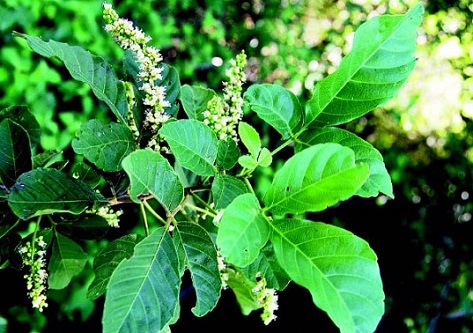Indian scientists discover that phytochemicals from Allophylus serratus can potentially treat Monkeypox (Mpox)
Nikhil Prasad Fact checked by:Thailand Medical News Team Aug 26, 2024 8 months, 2 hours, 54 minutes ago
Medical-News: A New Hope in the Fight Against Monkeypox
In an exciting development, a team of Indian scientists has uncovered that certain phytochemicals derived from the medicinal plant Allophylus serratus may have the potential to inhibit the activity of a critical enzyme in the Monkeypox virus (MPXV). This breakthrough discovery offers new hope in the global fight against this zoonotic disease, which has seen a resurgence in recent years. The research, conducted by scientists from Maharishi Markandeshwar (Deemed to Be University) in Haryana-India, along with collaborators from Chandigarh University-India and Amrita Vishwa Vidyapeetham University-India, suggests that natural compounds could provide an effective and safer alternative to current synthetic treatments.
 Indian scientists discover that phytochemicals from Allophylus serratus can potentially
Indian scientists discover that phytochemicals from Allophylus serratus can potentially
treat Monkeypox (Mpox)
The study found that the phytochemical: N-(2-Allylcarbamoyl-4-chloro-phenyl)-3,4-dimethoxy-benzamide from Allophylus serratus can inhibit the viral cysteine protease enzyme of the Monkeypox (Mpox) virus.
The study, detailed in this
Medical News report, focused on the in-silico screening of phytochemicals found in Allophylus serratus against the viral cysteine protease of MPXV. The research team, led by Dr. Poonam Bansal, used computational methods to identify the potential binding affinity of these natural compounds with the viral enzyme, which is crucial for the replication of the virus. This discovery is particularly significant as the enzyme has not yet been crystallized, posing challenges for traditional drug design and screening efforts.
Understanding the Monkeypox Virus and Its Threat
Monkeypox (Mpox) is caused by the Monkeypox virus, a member of the Orthopoxvirus genus, which also includes the viruses responsible for smallpox and cowpox. Although the symptoms of Monkeypox are generally milder than those of smallpox, the disease can still result in severe complications, particularly in individuals with weakened immune systems. The recent global outbreak of Monkeypox, which began in July 2022 and was declared a public health emergency by the World Health Organization (WHO), has underscored the need for effective treatments. According to the Centers for Disease Control and Prevention (CDC), as of November 2022, there have been over 80,000 reported cases of Monkeypox worldwide, affecting 110 countries and resulting in 53 deaths.
Despite the availability of vaccines and antiviral drugs, such as tecovirimat and cidofovir, the emergence of new strains of the virus and the side effects associated with these synthetic treatments have driven scientists to explore natural alternatives. The current study is part of a broader effort to identify safe and effective natural compounds that can be repurposed for the treatment of Monkeypox.
The Power of Phytochemicals
Allophylus serratus is a plant well-known in Ayurveda, the traditional system of medicine in India, for its anti-viral, anti-inflammatory, and anti-ulcerogenic properties. The plant is rich in bioactive compounds,
including flavonoids, tannins, steroids, phenolics, alkaloids, and saponins. These compounds have been shown to possess a range of medicinal properties, including anti-bacterial, anti-inflammatory, and anti-viral effects.
In this study, the researchers selected four phytochemicals from Allophylus serratus for in-silico screening: N-(2-Allylcarbamoyl-4-chloro-phenyl)-3,4-dimethoxy-benzamide, 6-Dimethylaminonaphthene-1-sulfonic acid amide, oleic acid, and dipentyl ester. These compounds were chosen based on their known medicinal properties and their potential to interact with the cysteine protease enzyme of the Monkeypox virus.
Key Study Findings: Promising Binding Affinities
The researchers employed molecular docking studies to evaluate the binding affinity of the selected phytochemicals with the viral cysteine protease.
The docking study revealed that all four phytochemicals exhibited binding affinities with the target viral protein, with N-(2-Allylcarbamoyl-4-chloro-phenyl)-3,4-dimethoxy-benzamide showing the highest binding affinity of -6.7 kcal/mol.
This high binding affinity suggests that this compound could be a strong candidate for further investigation as a potential therapeutic agent against Monkeypox.
In addition to its high binding affinity, N-(2-Allylcarbamoyl-4-chloro-phenyl)-3,4-dimethoxy-benzamide was found to form five hydrogen bonds with the amino acid residues of the cysteine protease. This interaction is significant because it indicates a stable and potentially effective inhibition of the enzyme's activity, which is critical for the replication of the virus.
The other three phytochemicals, 6-Dimethylaminonaphthene-1-sulfonic acid amide, oleic acid, and dipentyl ester, also demonstrated binding affinities ranging from -5.0 to -6.3 kcal/mol. These compounds formed hydrogen bonds with the enzyme, further supporting their potential as inhibitors of the Monkeypox virus.
The Path Forward: From In-Silico to In-Vivo Studies
While the results of this study are promising, it is important to note that these findings are based on in-silico (computer-based) models. The next step for the research team will be to conduct in-vitro (laboratory-based) and in-vivo (animal-based) studies to validate the effectiveness of these phytochemicals in inhibiting the Monkeypox virus. If successful, these natural compounds could be developed into new antiviral drugs that offer a safer and more effective alternative to current treatments.
The study's findings also highlight the broader potential of plant-derived compounds in the fight against emerging viral diseases. As the world continues to grapple with the threat of zoonotic diseases like Monkeypox, the exploration of natural remedies offers a promising avenue for the development of new treatments that are both effective and safe.
Conclusion: A Step Towards a Natural Remedy
The discovery of the inhibitory effects of phytochemicals from Allophylus serratus on the cysteine protease of the Monkeypox virus marks a significant step forward in the search for natural antiviral agents. The study suggests that these compounds, particularly N-(2-Allylcarbamoyl-4-chloro-phenyl)-3,4-dimethoxy-benzamide, could be developed into effective treatments for Monkeypox, providing a natural and safer alternative to synthetic drugs. The research also underscores the importance of continued exploration of traditional medicinal plants in modern drug discovery, especially in the face of emerging global health threats.
The study findings were published in the peer-reviewed Journal of Pure and Applied Microbiology.
https://microbiologyjournal.org/computational-purposing-phytochemicals-against-cysteine-protease-of-monkeypox-virus-an-in-silico-approach/
For the latest Mpox news, keep on logging to Thailand
Medical News.
Read Also:
https://www.thailandmedical.news/news/azadirachta-indica-neem-should-be-studied-and-explored-as-a-potential-adjuvant-in-mpox-monkeypox-treatments
https://www.thailandmedical.news/news/silico-study-identifies-the-phytochemical-punicalagin-as-a-potential-inhibitor-of-mpox-virus-that-targets-the-envelope-protein-e8
https://www.thailandmedical.news/news/university-of-wollongong-study-reveals-ginseng-as-a-potential-ally-against-monkeypox-mpox-infections
https://www.thailandmedical.news/news/computational-study-shows-that-phytochemicals-from-ficus-religiosa-exhibit-potential-for-combating-mpox-infections
